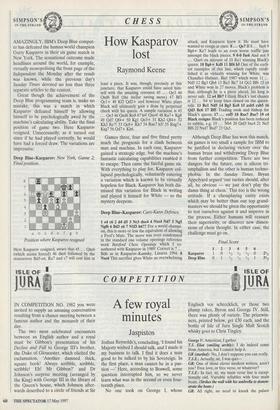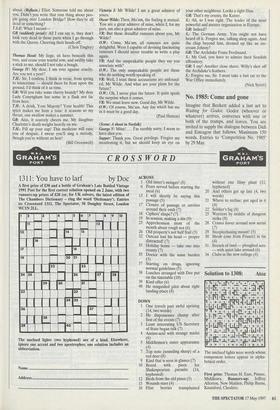ISLE OF
JORAii
sISGLE .11 SCOTCH UNISKI
ISLE OF
JURA
,INI I, .11, .,1:11,1,1
COMPETITION
A few royal minutes
Jaspistos
IN COMPETITION NO. 1982 you were invited to supply an amusing conversation resulting from a chance meeting between a famous author and the monarch of their day.
The two most celebrated encounters between an English author and a royal must be Gibbon's presentation of his Decline and Fall to George III's brother, the Duke of Gloucester, which elicited the exclamation, 'Another damned thick, square book! Always scribble, scribble, scribble! Eh! Mr Gibbon?' and Dr Johnson's surprise meeting (arranged by the King) with George III in the library of the Queen's house, which Johnson after- wards described to a circle of friends at Sir Joshua Reynolds's, concluding, 'I found his Majesty wished I should talk, and I made it my business to talk. I find it does a man good to be talked to by his Sovereign. In the first place, a man cannot be in a pas- sion —' Here, according to Boswell, some question interrupted him, so we never learn what was in the second or even four- teenth place.
No one took on George I, whose Englisch vos schrecklich, or those two plump rakes, Byron and George IV. Still, there was plenty of variety. The prizewin- ners, printed below, get £30 each, and the bottle of Isle of Jura Single Malt Scotch whisky goes to Chris Tingley.
George V: American, I gather.
T.S. Eliot (smiling archly): I do indeed come from America, but I cannot help it.
GR (startled): No, I don't suppose you can really. T.S.E.: Actually, sir, I was quo- GR: One of those clever modern writers, aren't you? Free love, or free verse, or whatever? T.S.E.: In fact, sir, my main verse line is excep- tionally old. Variable syllables with four main beats. (Strikes the wall with his umbrella to demon- strate the beats.) GR: All right, no need to knock the palace about. (Reflects.) Eliot. Someone told me about you. Didn't you write that rum thing about peo- ple going over London Bridge? How they're all dead or something?
T.S.E: What I meant- GR (suddenly jovial): All I can say is, they don't look very dead in those parts when I go through with the Queen. Cheering their heads off.
(Chris Tingley)
Thomas Hood: My liege, sit here beneath this tree, and cease your tearful row, and swiftly take a stick to me, should I not take a bough.
George IV: My dear, I am ever against cruelty. Are you not a poet?
T.H.: Sir, I confess, I think in verse, from spring to wintertime — should there be frost upon the ground, I'd think of it as rime.
GR: Will you take some cherry brandy? My dear Lady Conyngham has some in a flask not far from here.
T.H.: A drink, Your Majesty? Your health! This spirit makes me hum a tune: it seasons so my throat, one swallow makes a summer.
GR: Alas, it scarcely cheers me. My daughter Charlotte's death weighs heavily on me.
T.H.: Fill up your cup! This medicine will cure you of despair. I swear you'll sing a melody, though you're without an heir!
(Bill Greenwell)
Victoria I: Mr Wilde! I am a great admirer of yours.
Oscar Wilde: Then, Ma'am, the feeling is mutual. You are a great admirer of mine, while I, for my part, am also a great admirer of mine.
FR: But these dreadful rumours about you, Mr Wilde?
O.W.: Come, Ma'am, all rumours are quite delightful. Were I capable of devising fascinating rumours I should never trouble to write a play again.
FR: And the unspeakable people they say you associate with?
O.W.: The only unspeakable people are those who do nothing worth speaking of.
FR: Well, I trust these accusations are unfound- ed, Mr Wilde. And what are your plans for the future?
O.W.: Oh, I never plan the future. It quite spoils the surprise when it comes.
FR: We must leave now. Good day, Mr Wilde. O.W.: Of course, Ma'am. Any day which has me
in it must be a good day. (Paul Hatton) (Scene: A shoot in Norfolk)
George V: Mine! ... I'm terribly sorry, I seem to have shot you.
Sapper: Thank you. Great privilege. Forgive my mentioning it, but we should keep an eye on your other neighbour. Looks a right Hun. GR: That's my cousin, the Kaiser.
S.: Ah, so I was right. The leader of the most powerful and sinister organisation in Europe. GR: Indeed?
S.: The German Army. You might not have heard of it. Forgive me, talking shop again. And the chap beyond him, dressed up like an ice- cream Johnny?
GR The Archduke Franz Ferdinand.
S.: My God, you have to admire their fiendish effrontery.
GR: I say! Another close shave. Willy's shot off the Archduke's feathers.
S.: Forgive me, Sir. I must take a fast car to the War Office immediately.
(Nick Syrett)
No. 1985: Come and gone
Imagine that Beckett added a last act to Waiting for Godot. Godot (whoever or whatever) arrives, converses with one or both of the tramps, and leaves. You are invited to supply the dialogue between Didi and Estragon that follows. Maximum 150 words. Entries to 'Competition No. 1985' by 29 May.



































































 Previous page
Previous page